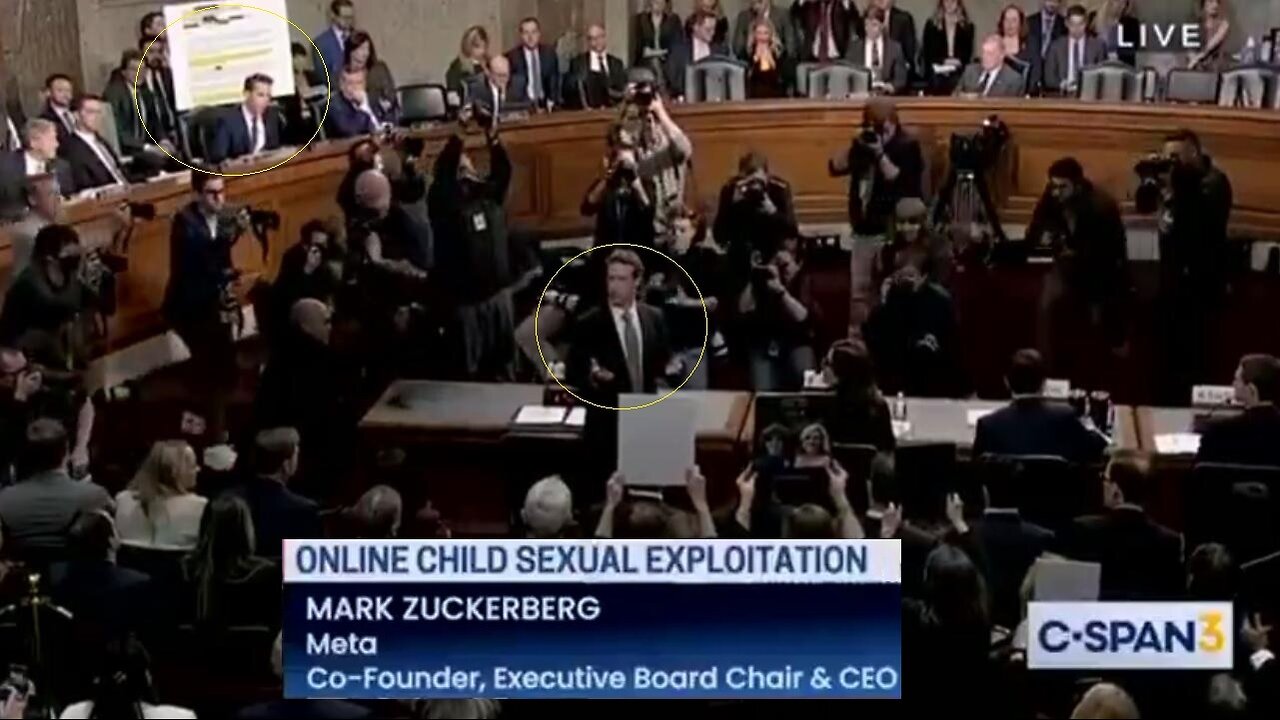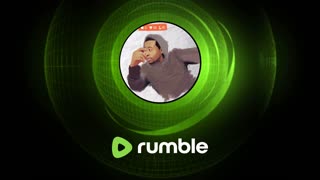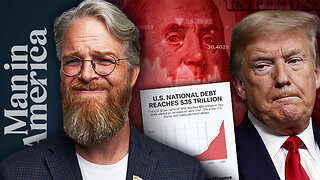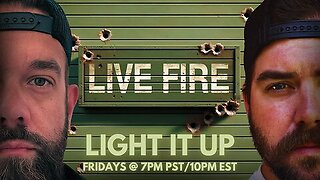Premium Only Content

💥 Senator Josh Hawley Confronts & Surprises Zuckerberg w/ Victims of Child-Sex Trafficking
Mark Zuckerberg today stood up during a Senate hearing and apologized to families who say social media contributed to their children's suicide or abuse.
The Meta chief, who runs Facebook, Instagram and WhatsApp, was rebuked by Senator Josh Hawley who asked him to address the public gallery directly during the hearing of the Senate Judiciary Committee.
'I'm sorry for everything you've all gone through,' Zuckerberg said. 'It's terrible. No one should have to go through the things that your families have suffered.'
Zuckerberg appeared alongside TikTok CEO Shou Zi Chew, Discord boss Jason Citron, X chief Linda Yaccarino and Snapchat founder Evan Spiegel.
All were grilled by Republicans about how they protect teenagers and children on their respective apps.
Senators Ted Cruz and Lindsey Graham used the occasion to chastise the Silicon Valley titans, claiming they don't do enough to protect kids from pedophiles and harmful content.
The bosses insisted that they do their utmost to shield youngsters from anything inappropriate, but conceded that they cannot always keep track of accounts due to the size and scale of their products.
Senator Ted Cruz said every parent in America was 'terrified about the garbage that is directed at our kids'.
'I have two teenagers at home, and the phones they have are portals to predators, to viciousness, to bullying, to self-harm... and each of your companies could do a lot more to prevent it,' he said.
Cruz pointed to a 2013 report that Instagram's algorithm was connecting pedophiles to accounts that advertised the sale of child porn - some of them run by children themselves, or featuring sex-trafficked kids.
'This content wasn't just living in the dark corners of Instagram, the algorithm was helping pedophiles to find it by promoting graphic hashtags,' he said.
He then held a blown-up screenshot of an Instagram prompt that asks users if they want to 'get resources' or 'see results anyway' when browsing harmful images.
The warning read 'these results may contain images of child sexual abuse', with an explanation underneath.
'You gave users two choices: "Get resources or see results anyway",' Cruz said, speaking directly to the Meta founder.
'Mr. Zuckerberg, what the hell were you thinking?', barely pausing long enough for the Meta founder to respond.
Zuckerberg said the 'basic science' behind the warning was that it was better to direct people searching for such content to get help, rather than blocking it
'I understand get resources, [but] in what sane universe is there a link for "see results anyway"?'
'Well, because we might be wrong,' Zuckerberg replied.
'We tried to trigger this warning when we think that there's any chance that there...'
'Ok you might be wrong... let me ask you, how many times was this warning screen displayed?' Cruz interjected.
Zuckerberg replied: 'I don't know the answer to that off the top of my head.'
Cruz said that was interesting because he asked it last June in an oversight letter and Meta refused to answer.
'Will you commit right now, to within five days answering this question for this committee?' he said.
'I'll personally look into it, but I'm not sure if we have that data.'
Cruz then asked how many time a user who got the warning clicked 'see results anyway'.
'I'm not sure if we stored that, but I'll personally look into this and we'll follow up after,' Zuckerberg replied.
'What follow up did Instagram do, when you have a potential pedophile clicking on that thinking "I'd like to see child porn" - what did you do next, when that happened?
Zuckerberg replied that Instagram took down anything that it thought was sexual abuse, and reported it to authorities
But Cruz wanted to know if anyone checked if the results actually were child porn, given he said 'we might be wrong'.
Zuckerberg said it was 'probably one of the factors' that helped lead to users being reported - and that Meta made 26 million reports to the National Center for Missing and Exploited Children, more than than the rest of the industry combined.
Senator Lindsey Graham began the session with a stirring rebuke of all five tech bosses, accusing their platforms of killing young people, but zeroed in on Meta.
'Mr. Zuckerberg, you and the companies before us, I know you don't mean it to be so, but you have blood on your hands,' he said.
'You have a product that's killing people. When we had cigarettes that were killing people, we did something about it - maybe not enough.
'You gonna talk about guns, we have the ATF... [but] nothing here, there's not a damn thing anybody can do about it (social media), you can't be sued.'
Senator Graham said internal Meta emails showed Zuckerberg was warned about the dangers of his apps, but decided not to hire 45 people to 'do a better job of policing this'.
'So the bottom line is you can't be sued. You should be, and these emails would be great for punitive damages, but the courtroom's closed to every American abused by all the companies in front of me,' he continued.
He said social media was the last industry he would give blanket immunity from liability to, and it was time to repeal laws that did so.
'After years of working on this issue with you and others, I´ve come to conclude the following: social media companies as they´re currently designed and operate are dangerous products,' Graham said.
'They're destroying lives, and threatening democracy itself. These companies must be reined in, or the worst is yet to come.'
Graham later said though social media had many upsides, the 'dark' side was becoming 'too great to live with'.
'I am tired of talking. I'm tired of having discussions,' he said.
'Open up the courthouse door. Until you do that, nothing will change. Until these people can be sued for the damage they're doing, it is all talk.
'I'm a Republican who believes in free enterprise, but I also believe that every American who's been wronged has to have somebody to go to to complain. There is no commission to go to that can punish you.
'There's not one law in the book because you oppose everything we do, and you can't be sued. That has to stop, folks.'
Families of kids 'killed by social media' pack hearing
The hearing started with recorded testimonies from kids and parents who said they or their children were exploited on social media.
Senator Chris Coons thanked families who held up photos of children who they said took their own lives after being sexually exploited via social media.
'This room is packed as far as the eye can see,' he said.
'The families that are here because they want us to see you, and to know your concern.
'You have contacted each of us in our offices expressing your grief, your loss, your passion, and your concern.'
Coons responded to Zuckerberg's reference to a National Academy of Sciences study that found 'at the population level' there was no proof of a link between social media and harm to young people.
'Well it may not be at the population level, but I'm looking at a room full of hundreds of parents who have lost children,' he said.
'Our challenge is to take the data and make good decisions about protecting families and children from harm.'
Coons said that when a door flew off Alaska Airlines flight 1282 earlier this month, dozens of planes were grounded for safety checks, even though no one died.
But nothing at all ever happened for social media companies, he said.
Among parents who lost children to suicide due to social media sexual exploitation was South Carolina state representative Brandon Guffey, who is suing Instagram.
Gavin Guffey, 17, died in 2022 after falling victim to sexual extortion, or 'sextortion,' where scammers posed as a girl and tricked the 17-year-old into sending a nude photo. They then demanded cash not to release it.
Rep Guffey learned what had led to the tragedy after he and his younger son began receiving messages demanding money in exchange for nude images of the late teen.
The lawmaker is now suing Meta for wrongful death and gross negligence, among other accusations. He claims the company is not doing enough to protect minors from online predators.
The lawsuit also accuses the company of sparking mental health issues in children such as depression and anxiety - and that it uses algorithms to target teens while not keeping them safe.
Zuckerberg claimed the responsibility should lie with app stores like those run by Apple and Google, to enforce age restrictions.
'My understanding is Apple and Google, or at least Apple, already requires parental consent when a child does a payment with an app,' he said.
'So it should be pretty trivial to pass a law that requires them to make it so that parents have control anytime a child downloads an app.'
Meta earlier this month, in preparation for the hearings, proposed its own legislation along those lines.
After grilling Zuckerberg, Cruz moved on to TikTok, asking about a Chinese law that forces all companies to support and cooperate with national security efforts.
Chew replied that TikTok wasn't available in Mainland China and an entity called Project Texas was created to put the US version 'out of reach' of such obligations.
Cruz said the law compelled companies to lie to protect national security secrets.
He then referred to an earlier statement in the hearing by Chew where he insisted that the Chinese Government never asked for TikTok data and it was never provided.
'I do not believe you, and the American people don't either,' Cruz said.
Cruz said an app that was 'essentially the same' as TikTok in China was promoting science and education videos and limited the amount of time children could use it
'In the US, you are promoting to kids self-harm videos and anti-Israel propaganda. Why is there such a dramatic difference?' he asked.
Chew said that wasn't accurate and there was a lot of beneficial content on TikTok.
Cruz then compared hashtag volume on Instagram and TikTok - twice as many for things like Taylor Swift and Donald Trump non Instagram.
But it was eight to one for #uyghur - an oppressed minority in China - and 30 to one for #tibet, 57 to one for references to Tiananmen Square, and 174 to one for protests in Hong Kong.
'Why is it that on Instagram, people can put up #HongKongProtest 174 times compared to TikTok? What censorship is TikTok doing at the request of the Chinese Government?' Cruz asked.
'None. Senator, that analysis is flawed and been debunked by other external sources,' Chew replied.
He said this was explained by not all videos carrying hashtags and that you couldn't selectively choose a few words - before he was cut off by Cruz
'What's the difference between Taylor Swift and Tiananmen Square? What happened at Tiananmen Square?' he asked, rhetorically.
'There were massive protests during that time,' Chew replied, insisting users could freely post about it.
'Our algorithm does not suppress any content simply based on... it doesn't'
'You're selectively choosing some words over some periods [and] we haven't been around as long as other apps.'
Hundreds if not thousands of Chinese pro-democracy protesters, mostly students, were massacred when the Chinese military stormed Tiananmen Square, in the center of Beijing, in June 1989.
Information about the event is one of the most heavily censored things in China.
The tech chieftains have been convened by the US Senate Judiciary Committee where they will be asked about the effects of social media in a session titled 'Big Tech and the Online Child Sexual Exploitation Crisis'.
The hearing could be grueling for executives confronting political anger for not doing enough to thwart online dangers for children, including from sexual predators.
'There are no tools to hold the company accountable. Instead, survivors and advocates are left to plead with these companies to choose safety over profit,' US Senator Dick Durbin, who heads the judiciary committee, said.
'They're responsible for many of the dangers our children face online.
'Their design choices, their failures to adequately invest in trust and safety, their constant pursuit of engagement and profit over basic safety have all put our kids and grandkids at risk.'
Zuckerberg is a veteran of congressional hearings since his first one over the Cambridge Analytica privacy debacle in 2018.
But it will only be the second time for TikTok boss Shou Zi Chew and the first for Linda Yaccarino, the chief executive of X.
What social media companies say they are doing
Beginning with Discord's Jason Citron, the executives touted existing safety tools on their platforms and the work they´ve done with nonprofits and law enforcement to protect minors.
Snapchat had broken ranks ahead of the hearing and began backing a federal bill that would create a legal liability for apps and social platforms who recommend harmful content to minors.
Spiegel reiterated Snapchat's support on Wednesday and asked the industry to back the bill.
Chew said TikTok is vigilant about enforcing its policy barring children under 13 from using the app. Yaccarino said X, formerly known as Twitter, doesn't cater to children.
'We do not have a line of business dedicated to children,' Yaccarino said.
She said the company would also support Stop CSAM Act, a federal bill that make it easier for victims of child exploitation to sue tech companies.
Zuckerberg said he was proud of the work his teams did to improve online child safety, not just on our services but across the entire internet.
Shou claimed the average of American TikTok user was older than 30, but admitted many children used the platform.
Ahead of their testimony, Meta and X, formerly Twitter, announced new measures seeking to satisfy any political pushback.
Meta, which owns the world's leading platforms Facebook and Instagram, said it would block direct messages sent to young teens by strangers.
By default, teens under age 16 can now only be messaged or added to group chats by people they already follow or are connected to.
Meta also tightened content restrictions for teens on Instagram and Facebook making it harder for them to view posts that discuss suicide, self-harm or eating disorders.
Zuckerberg is expected to tout the more than 30 existing tools and features designed to help parents and teens, according to a prepared testimony released ahead of the hearing.
The company has been beefing up its child safety features in recent weeks, announcing earlier this month that it will start hiding inappropriate content from teenagers accounts on Instagram and Facebook, including posts about suicide, self-harm and eating disorders.
It also restricted minors' ability to receive messages from anyone they don't follow or aren't connected to on Instagram and on Messenger and added new 'nudges' to try to discourage teens from browsing Instagram videos or messages late at night.
The nudges encourage kids to close the app, though it does not force them to do so.
But critics and child safety advocates say its actions fall short of meaningful changes that would address kids' safety.
Arturo Béjar, a former Meta engineering director known for his expertise in curbing online harassment recently testified before Congress about child safety on Meta's platforms.
'Looking back at each time there has been a Facebook or Instagram scandal in the last few years, they run the same playbook,' he said.
'Meta cherry picks their statistics and talks about features that don´t address the harms in question.'
'Instagram promises features that end up hidden in settings that few people use. Why is 'quiet mode' not the default for all kids?' Béjar added.
'Meta says that some of the new work will help with unwanted advances. It is still not possible for a teen to tell Instagram when they're experiencing an unwanted advance. Without that information how can they make it safer?'
Twitter said Yaccarino was in Washington last week to meet with senators to talk about how the company is addressing child sexual exploitation, along with a broad range of other topics that included privacy, artificial intelligence, content moderation and misinformation.
Google's YouTube is notably missing from the list of companies called to the Senate Wednesday.
That's even though more kids use YouTube than any other platform, according to the Pew Research Center. Pew found that 93 per cent of American teens use YouTube, with TikTok a distant second at 63 per cent.
VIDEO SOURCE: BREITBART: Enjoyed this video? Join my Locals community for exclusive content at breitbart.locals.com!
-
 2:31
2:31
Truths Unlimited
9 hours agoGITMO Report (1/22/25) Military Tribunals Taking Place - Riccardo Bosi
9741 -
 LIVE
LIVE
Akademiks
4 hours agoASAP Rocky Case has Begun . He's facing 24 years for SH**ting his friend!
7,400 watching -
 4:03:43
4:03:43
Benny Johnson
5 hours ago🚨Pete Hegseth Senate Confirmation Vote Happening LIVE NOW | MAJOR Shakeup at Pentagon
109K310 -
 2:14:18
2:14:18
FreshandFit
3 hours agoCastle Club Zoom Call Show
18.5K4 -
 1:01:08
1:01:08
SNEAKO
2 hours agoFRIDAY NIGHT VIBES
11.3K -
 1:16:47
1:16:47
Talk Nerdy 2 Us
9 hours agoTrump’s Biggest Sign, Sticker Mule’s Secrets & The Cybersecurity Threats They Don’t Want You to Know
2.94K5 -
 4:57:20
4:57:20
Robert Gouveia
6 hours agoHegseth Final Vote; Trump SLAPS Biased D.C. Judge; Rebuilding North Carolina
21.3K43 -
 47:40
47:40
Man in America
7 hours agoCan Trump Avert Economic Disaster Amid a $35T Debt Crisis? w/ Collin Plume
16.9K2 -
 LIVE
LIVE
I_Came_With_Fire_Podcast
10 hours ago🔥🔥Trump’s FIRST WEEK, FTOs, Deportations, & JFK FILES🔥🔥
240 watching -
 5:26:14
5:26:14
Barry Cunningham
7 hours agoTRUMP DAILY BRIEFING: PETE HEGSETH & KRISTI NOEM CONFIRMATIONS - TRUMP IN CALIFORNIA!
12.5K26